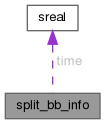split_bb_info Class Reference
Collaboration diagram for split_bb_info:

Data Fields | |
| unsigned int | size |
| sreal | time |
Detailed Description
Function splitting pass Copyright (C) 2010-2026 Free Software Foundation, Inc. Contributed by Jan Hubicka <jh@suse.cz> This file is part of GCC. GCC is free software; you can redistribute it and/or modify it under the terms of the GNU General Public License as published by the Free Software Foundation; either version 3, or (at your option) any later version. GCC is distributed in the hope that it will be useful, but WITHOUT ANY WARRANTY; without even the implied warranty of MERCHANTABILITY or FITNESS FOR A PARTICULAR PURPOSE. See the GNU General Public License for more details. You should have received a copy of the GNU General Public License along with GCC; see the file COPYING3. If not see <http://www.gnu.org/licenses/>.
The purpose of this pass is to split function bodies to improve
inlining. I.e. for function of the form:
func (...)
{
if (cheap_test)
something_small
else
something_big
}
Produce:
func.part (...)
{
something_big
}
func (...)
{
if (cheap_test)
something_small
else
func.part (...);
}
When func becomes inlinable and when cheap_test is often true, inlining func,
but not fund.part leads to performance improvement similar as inlining
original func while the code size growth is smaller.
The pass is organized in three stages:
1) Collect local info about basic block into BB_INFO structure and
compute function body estimated size and time.
2) Via DFS walk find all possible basic blocks where we can split
and chose best one.
3) If split point is found, split at the specified BB by creating a clone
and updating function to call it.
The decisions what functions to split are in execute_split_functions
and consider_split.
There are several possible future improvements for this pass including:
1) Splitting to break up large functions
2) Splitting to reduce stack frame usage
3) Allow split part of function to use values computed in the header part.
The values needs to be passed to split function, perhaps via same
interface as for nested functions or as argument.
4) Support for simple rematerialization. I.e. when split part use
value computed in header from function parameter in very cheap way, we
can just recompute it.
5) Support splitting of nested functions.
6) Support non-SSA arguments.
7) There is nothing preventing us from producing multiple parts of single function
when needed or splitting also the parts. Per basic block info.
Field Documentation
◆ size
| unsigned int split_bb_info::size |
◆ time
| sreal split_bb_info::time |
The documentation for this class was generated from the following file: